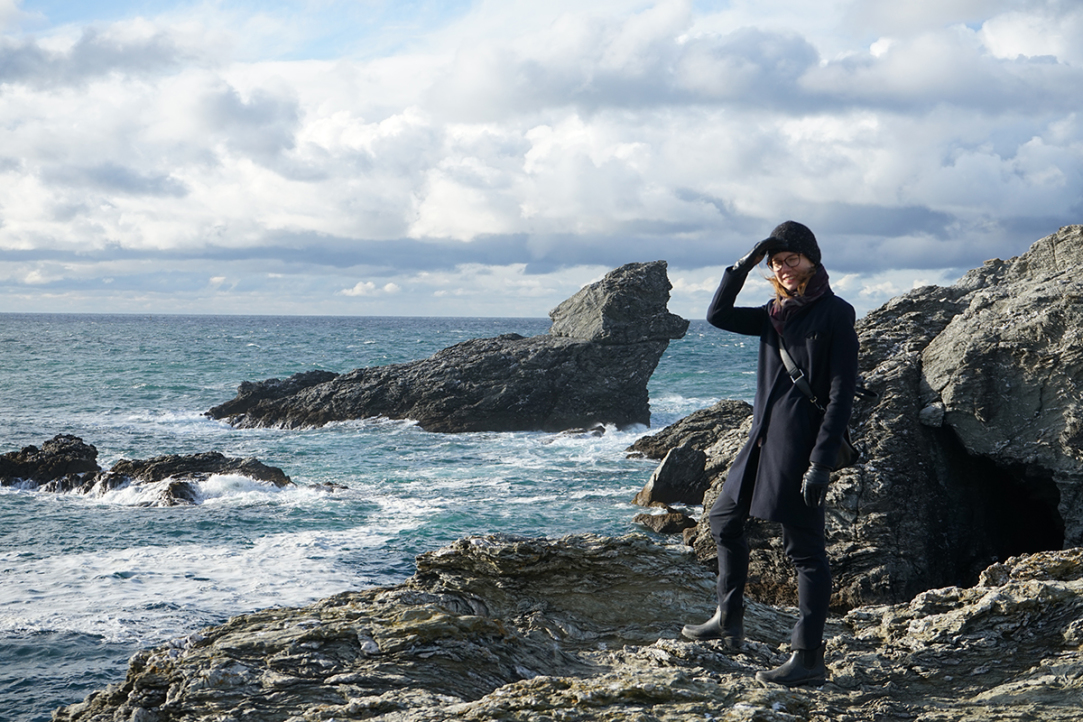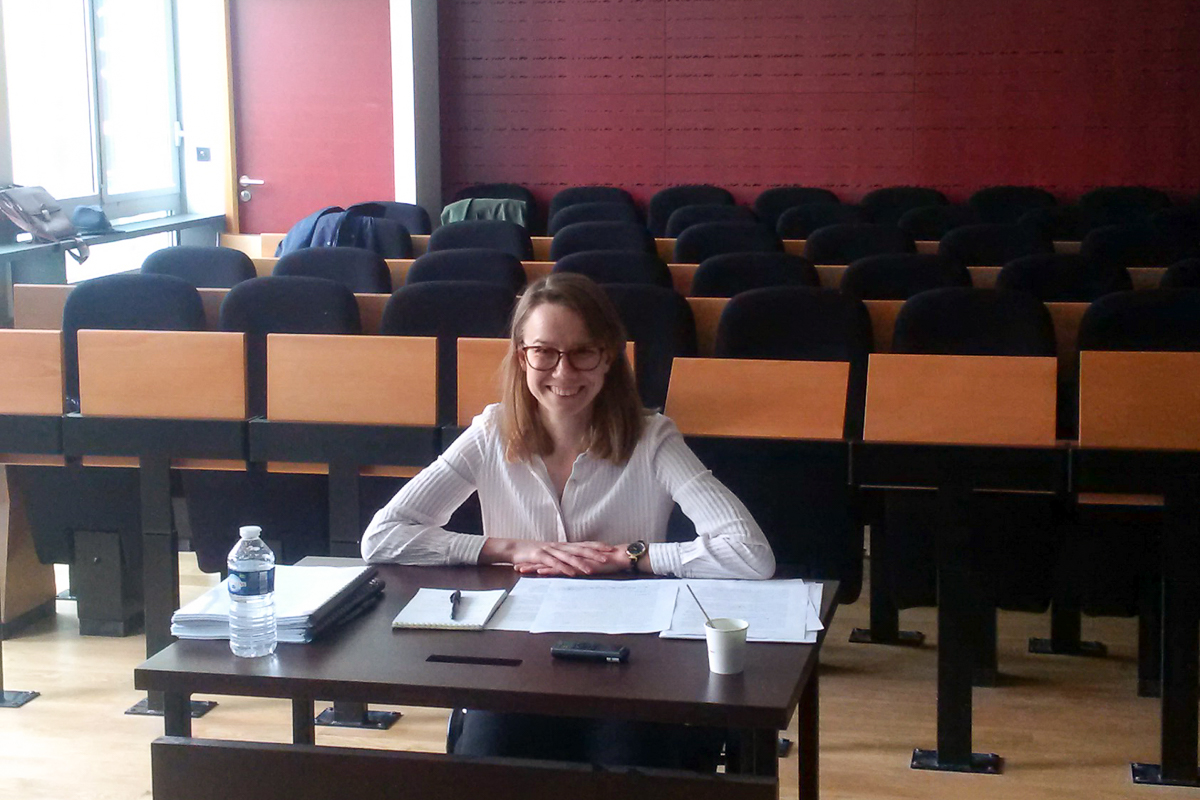Between Two Universities

Alina Pertseva, who earned her PhD in Philosophy from the Doctoral School of Philosophy at HSE in 2017, defended her dissertation at two universities at once — HSE and the University of Paris VIII. In an interview with the HSE news service, Pertseva discussed how she managed to do this and how the Russian and French approaches to research differ.
I am a sociologist, both in terms of my undergraduate education (I hold a Bachelor’s degree in sociology from Moscow State University) as well as my early work experience (qualitative research). It is from sociology, probably, that I get my love of research. At the same time, however, it is philosophy — French philosophy, in particular — that captured my real interest. In pursuit of this interest, I enrolled in the Master’s programme in philosophy at the University of Paris VIII (Vincennes - Saint-Denis) with the support of French University College.
Studying in the Master’s programme there helped me become more attuned to the specific intellectual approaches in contemporary French philosophy, mental processes, and methods of writing, but it was my love of research that motivated me to go further.
Moreover, I was particularly drawn by one fairly specific issue in French philosophy: how and under what conditions one can conceptualize a subject’s visibility without turning it into another object. Upon first glance, the question may seem far-fetched, but believe me – from a philosophical point of view it is a difficult question, and I wanted to demonstrate its significance in philosophical discourse. For this project I received funding (a so-called “doctoral contract”) from the Paris VIII Postgraduate School.
A Typical Endeavour?
My decision to study in Moscow and Paris simultaneously was due to the fact that I was unable (nor did I want) to spend all three or four years of my time at university studying abroad. So I enrolled both in the programme in Paris and the doctoral programme in philosophy at HSE simultaneously.
In France, this kind of ‘dual’ supervision of doctoral students is well developed and considered commonplace. A graduate student divides his or her time between two universities in different countries, and he or she has two different academic advisors. The student writes a single dissertation and defends it at one of the universities (the ‘pilot university’) before a dissertation committee made up of professors from the two universities and their respective countries.
In my case the well-developed system, of course, did not work so smoothly. The Russian requirements of the institution hosting the dissertation defence are not very flexible, and it is sometimes difficult to align them with European university standards. In the end, it seemed I was doomed to a ‘double life’ while the universities negotiated the conditions of my defence. I alternated my time between Moscow and France, fulfilling the requirements of both universities while continuing to work intensively on my research project.
The Risk of ‘Bifurcation’
My dissertation advisors were Patrick Vauday in Paris and Nina Sosna in Moscow (both of whom I wanted to work with from the very beginning).
Comparing my experience at the universities from a formal standpoint, I would say that at the University of Paris VIII there was a more of an emphasis on the research itself: of central concern was how much my research progressed over the course of a year, what difficulties or doubts arose, and the specific ways in which I could move forward. At the Higher School of Economics, the requirements were largely based on approbation, or external measures: submission of publications, participation in conferences, and gaining pedagogical experience. These differences, of course, did not contradict one another, but rather complemented each other and furthered my research.
However, there lie even deeper differences between the two universities than these. Even by virtue of their different geographical locations, Russian and French scholars have very different conceptions of what French philosophy is and how one should write about it. Thus, there arose an inevitable gap between the two educational and scholarly systems that I had to reconcile. This was particularly difficult to do from the standpoint of my research itself.
The institutional, and at times philosophical, differences between the two systems constantly forced me to clarify my research project, more persistently carry out my vision of the topic and problem, and apply more rigorous standards to its development. Being between two educational systems — in a situation of entre-deux, as the French say — I did everything within my power to be more confidant about my project, and to avoid the risk of its ‘bifurcation’.

Alina Pertseva earned her PhD in Philosophy from HSE in 2017
Photo courtesy of Alina Pertseva
A Window of Opportunity
At first the universities could only agree upon two defences — one in Paris in accordance with the French guidelines of dual supervision and one in Moscow in accordance with the Russian requirements.
I was already ready to resign myself to these inconvenient circumstances when suddenly, thanks to HSE’s transition to a new system of requirements for dissertation defences, there appeared a new ‘window of opportunity’. It did not open by itself — it had to first be identified — and this would not have been possible without the initiative of our academic director Anastasia Ugleva.
Already in my fourth year, when I was preparing to submit my dissertation for the defence — literally at the last moment — Professor Ugleva called me with a proposal to try to organize a single defence in Moscow in accordance with the guidelines of both universities. For everyone involved with the process, it was a winning option.
One Time, One Place
A lengthy process of negotiation ensued. It seemed that the closer my defence date got, the more conflicts and unexpected requirements arose. It took a nontrivial amount of bureaucratic efforts from dozens of people on each side. I learned a lot about what it takes sometimes to change just one word on an official document, and the joy even the smallest bureaucratic victory can bring.
But I can now say with confidence that the efforts were worth it. First of all, I felt confidant at the defence seeing familiar faces there from both countries and knowing that some of them travelled a long way specially for my defence.
Secondly, it was genuinely fascinating. It was interesting to observe how disparate expectations, habits, and rituals surrounding a dissertation defence converged at a single time and place. For me, of course, this meant a lack of answers and solutions that were equally satisfactory and familiar to all members of the committee. But as a result, I think, a genuinely interesting conversation resulted with different points of view on my project, over which I had toiled for three years in two languages.
Thus, despite all the differences, a productive dialogue took place, and it became an integral part of my research.
It is my hope that ‘dual supervision’ and ‘dual defences’ at Russian universities become more streamlined in the future — there are topics of inquiry for which they would give quite tangible results.
In my case, without Paris, I would not have had access to the sources necessary for my dissertation research (I spent the majority of my time in libraries); without Moscow I wouldn’t have had some necessary distance from these (it was here in Moscow that I wrote some particularly compelling parts of my dissertation).
Between Two Disciplines
Having grown a bit fatigued from managing a ‘double’ (work) load — my enthusiasm for the subject notwithstanding — I now find myself being drawn back to applied sociology, where my love of research began.
Nonetheless, during my time at the two universities, I grew accustomed to my position of entre-deux — between two systems. Now I would like to occupy this position once more—though this time not between two systems but between two disciplines — empirical sociology and philosophy, i.e., to be a kind of ‘practicing philosopher’ in the same sense we have in mind when we say, for example, a ‘practicing doctor’.
Here I have in mind not applying knowledge to practice, but rather combining theory with practice, being inspired by practice in theory, studying the practice of theory. For me a PhD is not a ticket to a place where I would otherwise not be permitted, but a real scholarly experience that I would like to develop further.
In order to do this, periodically opening ‘windows of opportunity’ is necessary, and I hope that they will continue to appear in Russia.
International applicants are invited to submit their applications to HSE Doctoral Schools. If you apply before March 28, 2019, you may be eligible for a merit-based full-tuition scholarship.
Nina Sosna
Associate Professor at the School of Cultural Studies
Anastasia V. Ugleva
Associate Professor at the School of Philosophy
